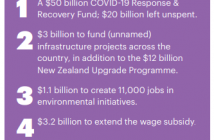Rapidly rising house prices are expected to ease this autumn, following the Reserve Bank’s announcement that its loan-to-value ratio (LVR) regime will be reinstated as of 1 March, with restrictions becoming even tighter later in the year

LVR restrictions are one of the Reserve Bank’s tools designed to reduce the risk associated with ‘boom-bust’ cycles. They set a ceiling on the percentage of new mortgage lending that banks can offer at high LVRs.
“LVR restrictions were removed in April 2020 to ensure they didn’t interfere with COVID-19 policy responses aimed at promoting cash flow and confidence,” Reserve Bank Deputy Governor and General Manager of Financial Stability Geoff Bascand says.
“Since then, in part due to the success of the health and economic policy responses, we have witnessed a rapid acceleration in the housing market, with new records being set for the national median price, and new mortgage lending continuing at a strong pace.
“We are now concerned about the risk a sharp correction in the housing market poses for financial stability. There is evidence of a speculative dynamic emerging with many buyers becoming highly leveraged.
“A growing number of highly indebted borrowers, especially investors, are now financially vulnerable to house price corrections and disruptions to their ability to service the debt. Highly leveraged property owners, in particular investors, are more prone to rapid ‘fire sales’ that potentially amplify any downturn.
“These financial stability risks exceed the situation at the time of the Bank’s December LVR consultation, resulting in more restrictive policy settings being decided on. As of 1 March the Reserve Bank will be reinstating LVR restrictions at the same level they were set at prior to the onset of COVID-19, with a further tightening of investors’ restrictions taking effect on 1 May. The two step process is necessitated by mortgage lenders’ operational capabilities.”
From 1 March 2021:
- LVR restrictions for owner-occupiers will be reinstated to a maximum of 20% of new lending at LVRs above 80%.
- LVR restrictions for investors will be reinstated to a maximum of 5% of new lending at LVRs above 70%.
From 1 May 2021:
- LVR restrictions for owner-occupiers will remain at a maximum of 20% of new lending at LVRs above 80%.
- LVR restrictions for investors will be further raised to a maximum of 5% of new lending at LVRs above 60%.
Reinstating the LVR policy will also reinstate the existing exemptions applying to the LVR restrictions for both owner-occupier and investor mortgages, including:
- A new build exemption where the borrower commits to the purchase at an early stage of construction or buys the residence (within six months of completion) from the developer;
- Kāinga Ora’s First Home Loans scheme (formerly Welcome Home Loans), for low deposit borrowers to buy their first home; and,
- Loans for remediation required to bring a residence up to new building codes, or to comply with new rental property standards (for example, installing insulation).
“We expect mortgage lenders to respect the 60/5 investor restrictions immediately with all new loan approvals, to ensure that their mortgage lending is consistent with our policy decision,” Bascand says.
Century 21 New Zealand Owner Derryn Mayne supports the move.
“We all know last year’s nearly 20% rise in house prices is not sustainable. Good on the Reserve Bank for confirming it’s set to cool the jets in a manageable way,” she says.
“With property investors now making up about 27% of all buyers, putting the brakes on them makes some sense. Putting the brakes on many first-home buyers will be hard on young Kiwis though. In Auckland, a mandatory 20% deposit could mean $200,000 needed up front. Sadly, that could mark the end of the road for many prospective first-home buyers, unless the Government has a plan for them,” she says.
The Century 21 leader notes another Reserve Bank policy – the mortgage holiday scheme – will expire on 31 March. This will add pressure to tens of thousands of Kiwi families with a rise in exit and mortgagee sales inevitable.
Mayne says combined with major tenancy law changes taking effect this week, many Kiwis will pull back from buying a residential investment property.
Finance Minister Grant Robertson has made it clear the Government will take bold action when it comes to housing – to be unveiled in May’s Budget. ‘The market has moved quickly and rapidly in a way that is not sustainable. We have to confront some tough decisions, and we will do that,’ Robertson told a business breakfast.
“We await with interest, as will increasingly frustrated first-home buyers. Regardless, autumn is lining up to be the season when New Zealand’s real estate starts returning to a more sustainable track. Kiwis looking at selling their homes should act now,” says Mayne.



